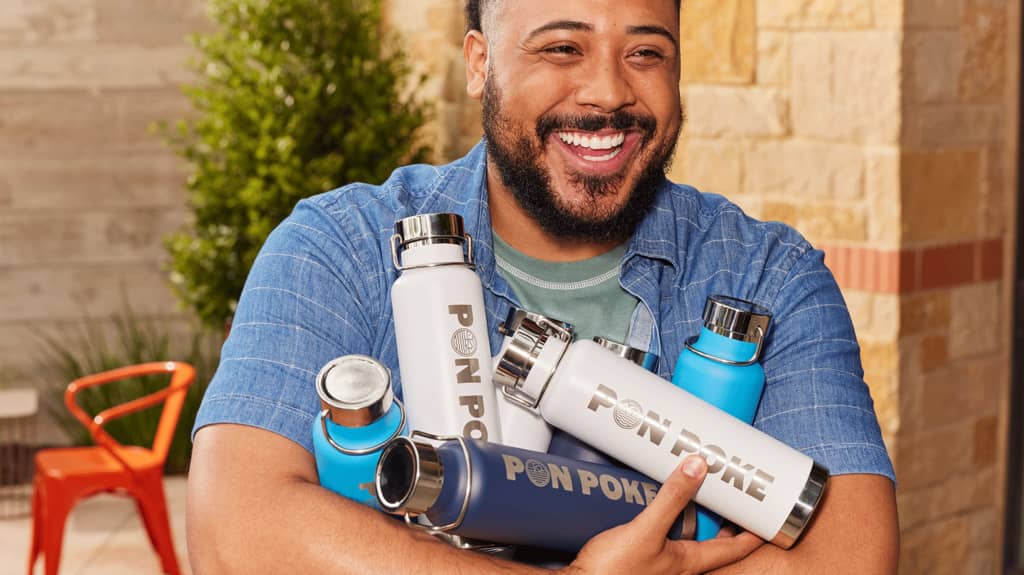Everyone knows recognition matters at work. Yet half of the employees in the United States did not receive any corporate gifts in the past year. To understand how recognition through employee gifts affects engagement and culture, we surveyed a thousand employed Americans across every generation, work arrangement and company size. The data is clear. When organizations get gifting right, people feel motivated, valued and proud to be part of the team. When recognition does not show up, neither do those feelings.
This article explores which workplace milestones deserve celebration, what kinds of gifts make an impact at every budget and why small touches, like a handwritten note, can transform a simple object into an emotional moment.
- 51% of employees did not receive a corporate gift last year, yet most say recognition would make them feel more motivated and valued.
- Promotions (59%) and work anniversaries (54%) are the most meaningful milestones to celebrate, though 43% say personal life events, like weddings or new babies, also matter.
- High quality, practical gifts are most appreciated with 51% valuing quality and 41% preferring items they can use every day.
- Personal touches make gifts meaningful – 50% say a handwritten note turns a gift into a memorable moment.
- Recognition drives culture: 62% feel more motivated, 54% say they would stay longer and 49% would recommend their employer when they feel valued.
Key trends in employee gifts
Half of employees are not getting corporate gifts at work
The recognition gap is real. Only 49% of employees say they received corporate gifts from their employer in the past year, which means a surprising 51% received nothing at all. That is a lot of missed opportunities to say “we appreciate you.”
The gaps show up across nearly every workplace group.
- Small companies: 65% didn’t receive gifts
- Large companies: 54% didn’t receive gifts
- Remote workers: 54% didn’t receive gifts
- On-site workers: 58% didn’t receive gifts
- Boomers: 69% didn’t receive gifts
When half of your workforce goes unrecognized, it sends a message – even if unintentionally. Employees want acknowledgment when they hit a milestone at work and when life outside of work is worth celebrating. The simplest employee gifts signal that you care.
If you are just starting your program, check out affordable employee gift ideas like branded desk items or a personal note paired with custom drinkware.
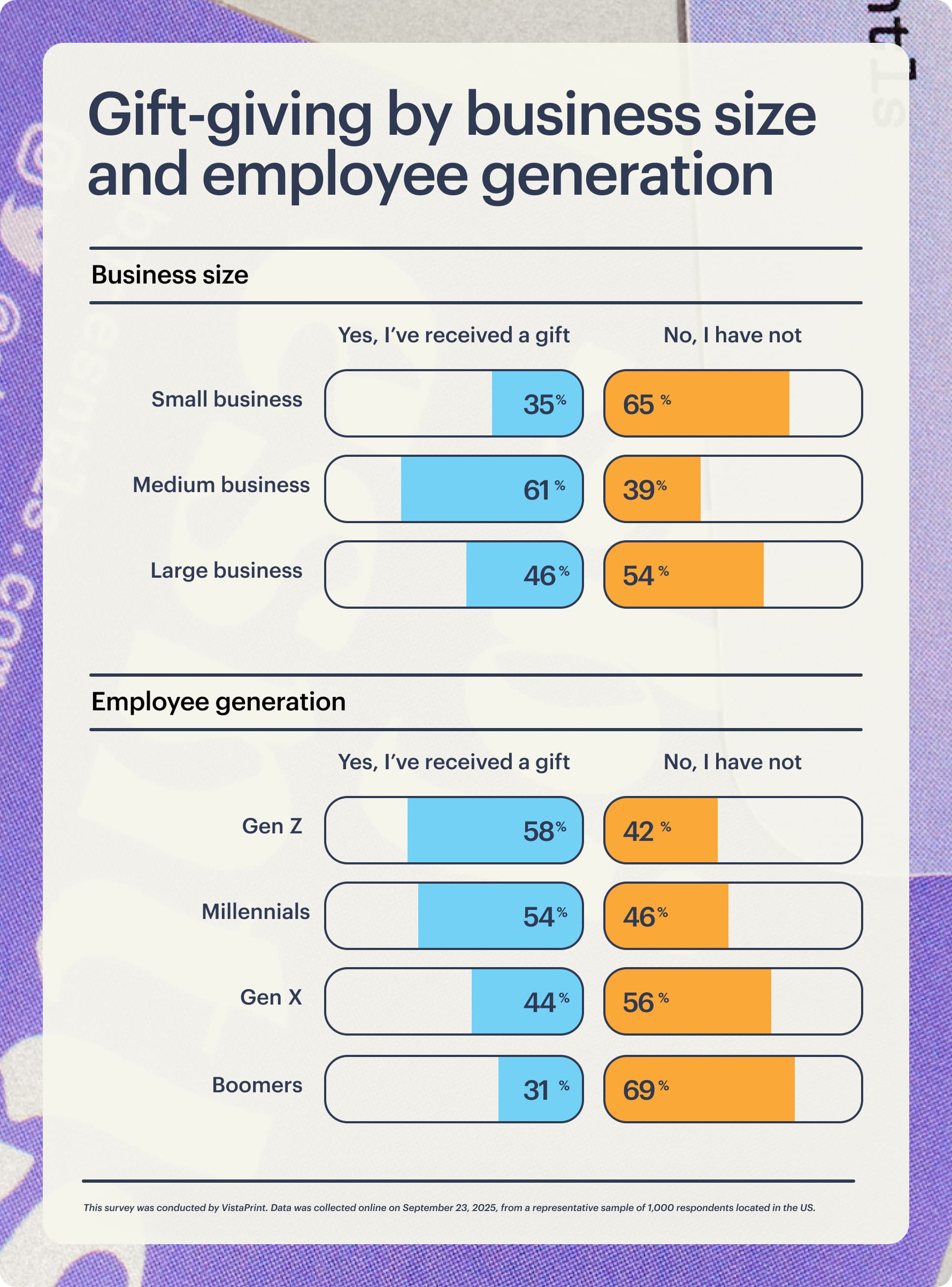
Personal milestones need more love
Work is personal. While recognition often focuses on promotions and big project wins, employees want companies to acknowledge real life milestones, too.
The data makes it clear:
- 21% say personal milestones are not recognized enough
- 27% say neither type of milestone is recognized well
Hybrid workers felt the most balanced appreciation, with 46% saying personal and career achievements are treated equally. Large companies showed the biggest gap, with only 32% agreeing.
Life moments like birthdays, new babies, weddings or moving homes shape how people show up at work. When those moments are ignored, employees feel like they are only valued for productivity.
You do not have to go big. A personalized employee gift or custom card can show you are paying attention. If you are looking for some inspiration, explore these unique promotional gift ideas.
Acknowledge the whole person, not just the job title. Recognition that celebrates the human behind the employee builds belonging and increases emotional loyalty.
Younger employees are getting noticed more
Recognition should feel fair across every generation.
Right now, the youngest workers are the most likely to receive corporate gifts. The percent of people who report receiving gifts by generation:
- Gen Z: 58%
- Millennials: 54%
- Gen X: 44%
- Boomers: 31%
Hybrid workers consistently see the most gifting, regardless of age, with 65% receiving gifts. Boomers receive the least recognition, which can contribute to feeling overlooked and disengaged.
If your recognition program skews younger, older employees may feel like they have moved past the “celebrated” stage of their career. Consistency matters for trust.
Promotions and anniversaries matter most
These are the milestone moments employees expect to be celebrated with corporate gifts. Promotion and service recognition are powerful signals that the company sees and values growth.
Across the survey, here are the kinds of events that respondents felt deserving of a gift:
- Promotions: 59%
- Work anniversaries: 54%
- Retirements: 48%
- Personal life events, like weddings or new babies: 43%
Yet gifting does not always follow those expectations. Work anniversaries are the most common occasion for employee gifts at 36%, followed by promotions at 28%. That gap represents missed opportunities to acknowledge hard work in real time.
Promotions represent tangible progress. Anniversaries reflect loyalty and contribution over time. When companies honor both, they reinforce culture and show that long-term commitment goes both ways.
To get started with something easy, explore custom apparel for onboarding or team celebrations.
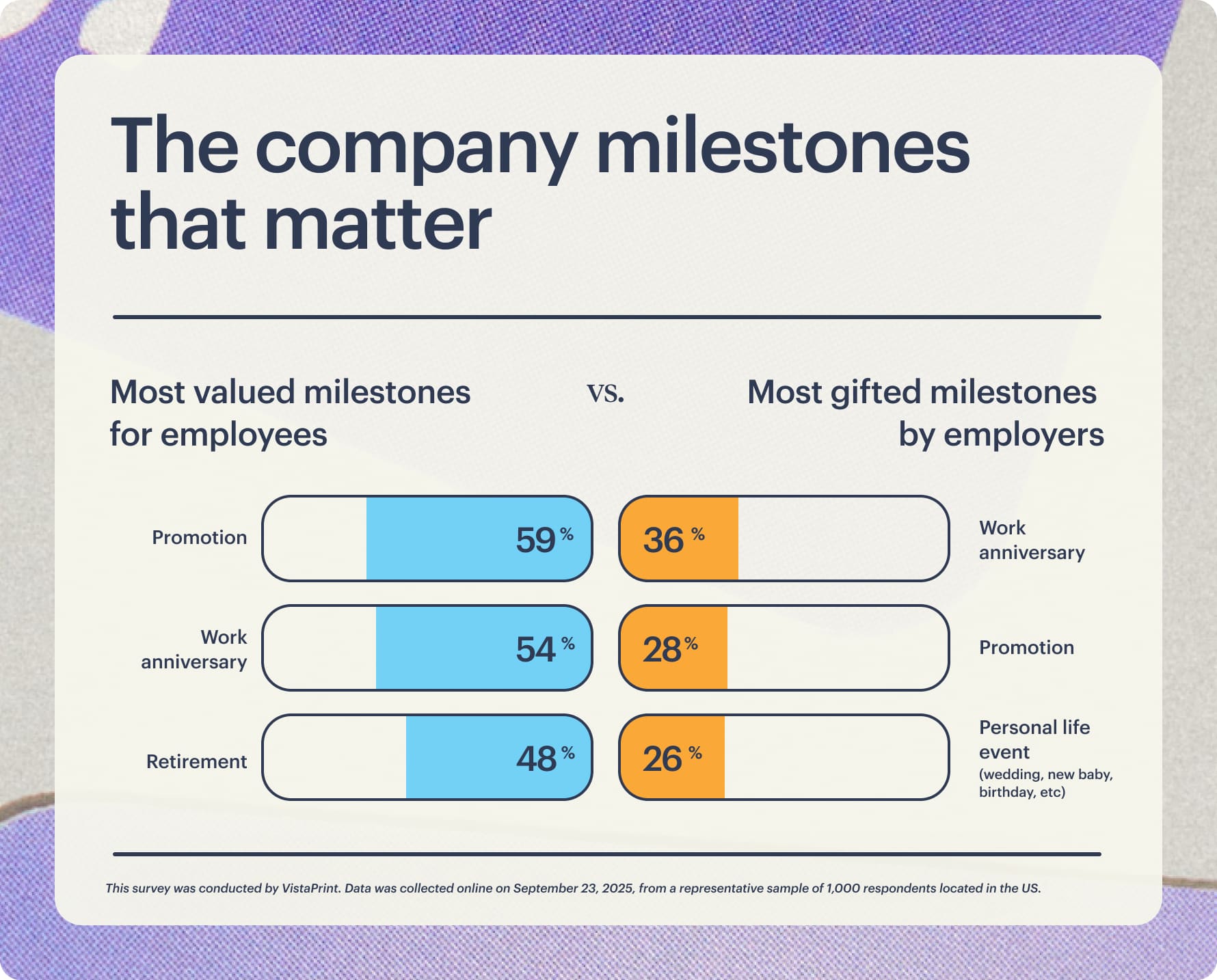
Milestone gifts are deeply meaningful
Recognition does more than check a box. It strengthens people’s emotional connection to their work and their place in the company. When employees receive milestone corporate gifts, the gesture often means far more than the item itself.
Nearly three-quarters of employees say these gifts hold real meaning:
- 39% say gifts are very meaningful
- 32% say extremely meaningful
- 58% feel more valued
- 31% feel more motivated to contribute
That means a small moment for the business can create a lasting emotional lift for the employee. Whether it is a promotion, a first work anniversary or a major personal milestone, a thoughtful gift tells someone their effort has been seen and appreciated.
This emotional payoff matters. When people feel valued, they are more engaged, more creative and more willing to go the extra mile. It also reinforces loyalty. Employees who feel recognized are more likely to stick around and recommend their workplace to others. In a competitive hiring landscape, that is a cultural advantage you cannot afford to miss.
The corporate gifts employees actually want
Under $20: Keep it simple and tasty
Meaning does not require a big budget. When a gesture arrives at just the right moment, small employee gifts have a big impact. In fact, everyday recognition is one of the easiest ways to boost morale across teams.
Employees told us that practical and tasty surprises consistently rise to the top, with a preference for:
- Snacks or coffee and tea: 56%
- Branded mugs or tumblers: 43%
- Tote bags: 32%
These affordable corporate gifts brighten an ordinary workday and help celebrate small but significant wins. A treat after a tough week or a quick surprise in the mail shows that hard work is noticed even outside the big milestones.
Budget-friendly gifts are best suited for personal shoutouts, birthdays or a quick thank you. They also allow HR and managers to spread recognition more often, creating a continuous sense of appreciation rather than saving praise for major events only.
Get started with affordable picks that still feel personal, like custom drinkware or snackable gifts employees can enjoy right away.
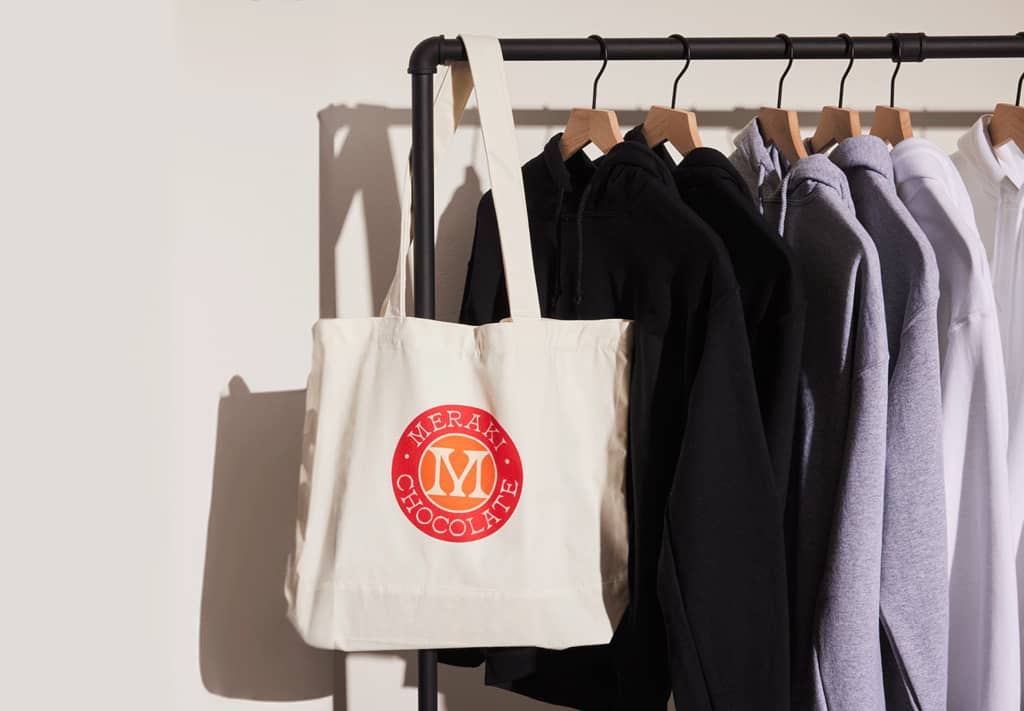
The $20-$49 sweet spot for common milestones
The $20-$49 price tier hits the balance most employees appreciate, making these gifts ideal for reinforcing the value of progress and loyalty. These gifts feel genuine without requiring major approvals or large budgets.
Survey favorites in this range include:
- Food or snack boxes at 40%
- Insulated drinkware at 40%
- Polo shirts or branded apparel at 38%
These employee gifts feel substantial because they are useful, visible and often tied to a sense of belonging. A first work anniversary, a strong quarter or a warm welcome during onboarding are all moments where something wearable or shareable can serve as a lasting reminder of the company’s appreciation.
Importantly, this tier resonates across every work model. Whether employees are remote, onsite or hybrid, they can enjoy a gift that integrates into daily routines. It also creates brand pride as people are more likely to use or wear items regularly when they feel well made.
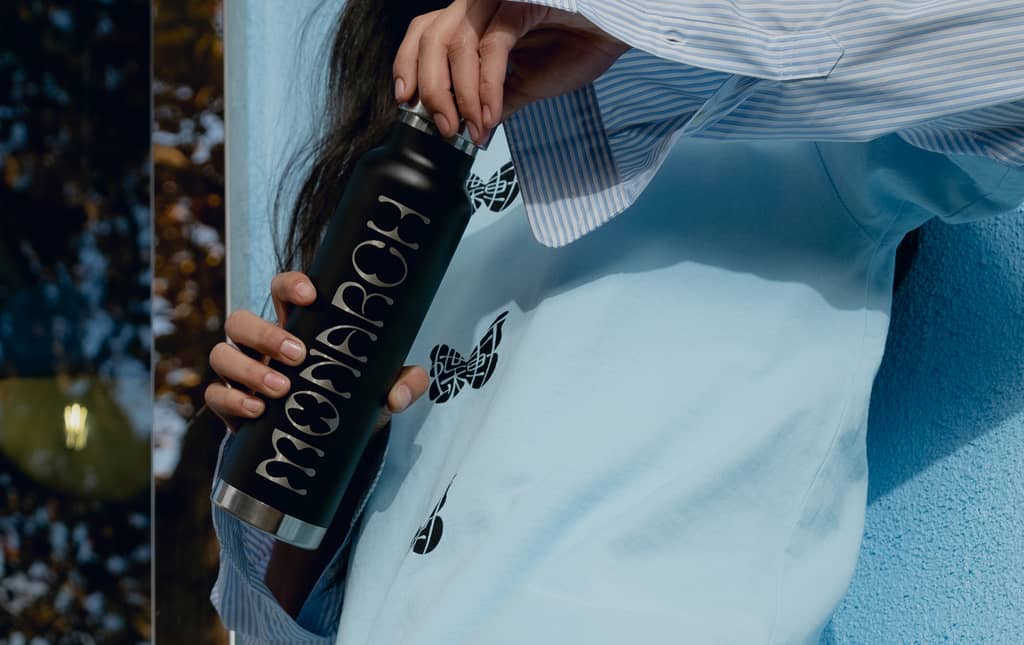
Employees appreciate branded apparel that feels good to wear, fits well and reflects the culture of the team. When people are proud to put something on, the gift becomes part of their everyday life rather than something that gets left in a drawer.
Choose apparel that is comfortable and well made, so it gets worn often. A quality T-shirt or polo can quickly become a go-to favorite. For help picking the right fit and fabric, explore our guide to the best T-shirt brands for custom printing.
$50-$100 gifts when you want to make a statement
As milestones grow in significance, the gift should reflect that jump in impact. The $50–$100 tier signals a clear “we see the effort you put in and we value it.” These gifts feel elevated yet still accessible for most teams, which makes them perfect for moments that mark real progress in an employee’s journey.
Top picks in this range include:
- High-end backpacks or travel bags at 48%
- Tech accessories at 47%
- Fleece or hoodies at 44%
What makes these items especially meaningful is utility. Employees will use a great bag for their commute, rely on practical tech accessories at home or the office and wear cozy apparel across seasons. The more an item is a part of someone’s everyday life, the more often they are reminded that their contribution mattered.
Hybrid employees report particularly strong appreciation for this tier because it supports a work style that moves between home and the workplace. These items travel with them and represent the company wherever they go, reinforcing pride in being part of the team.
This tier is ideal for:
- Promotions
- Major project completions
- Multi-year anniversaries
- Leadership development moments
$100+ goes big for major milestones
Some moments deserve more than a quick congratulations. When an employee reaches a career milestone that reflects years of effort, leadership or dedication, the gift should match that significance. The $100+ tier delivers a clear message that the achievement is truly valued and will be remembered.
Top categories in this tier include:
- Premium tech at 51%
- Experience-based gifts at 50%
- Personalized luxury items at 39%
These gifts do more than impress. Premium technology devices become essential tools that support productivity every day. Experience-based rewards like a special outing or travel voucher create memories that live beyond the workplace. Personalization elevates any item into something sentimental and lasting.
Employees associate this level of gifting with milestones that mark identity and legacy within the organization, such as:
- Retirement celebrations
- Tenth or twentieth anniversaries
- Senior leadership promotions
- Career-defining accomplishments that shape the company
When a company invests at this level, employees feel seen not only for their contribution but also for the years they have devoted. These gifts often spark stories employees proudly share with friends, family and even future colleagues.
By reserving this tier for the biggest moments, you establish a recognition culture that rewards loyalty and ambition while creating milestones employees aspire to reach.
Ideas and tips to elevate your corporate gifts
Practical and thoughtful gifts win
Across every age group and company size, employees consistently value corporate gifts that fit their real lives. They want items that feel useful, not gimmicky – something they will reach for again and again.
What matters most:
- High quality: 51%
- Practical for daily use: 41%
- Connected to personal interests: 40%
This is good news for businesses working with limited budgets. A thoughtful gift does not need to be flashy or expensive to be appreciated. It simply needs to make life easier or more enjoyable for the person receiving it.
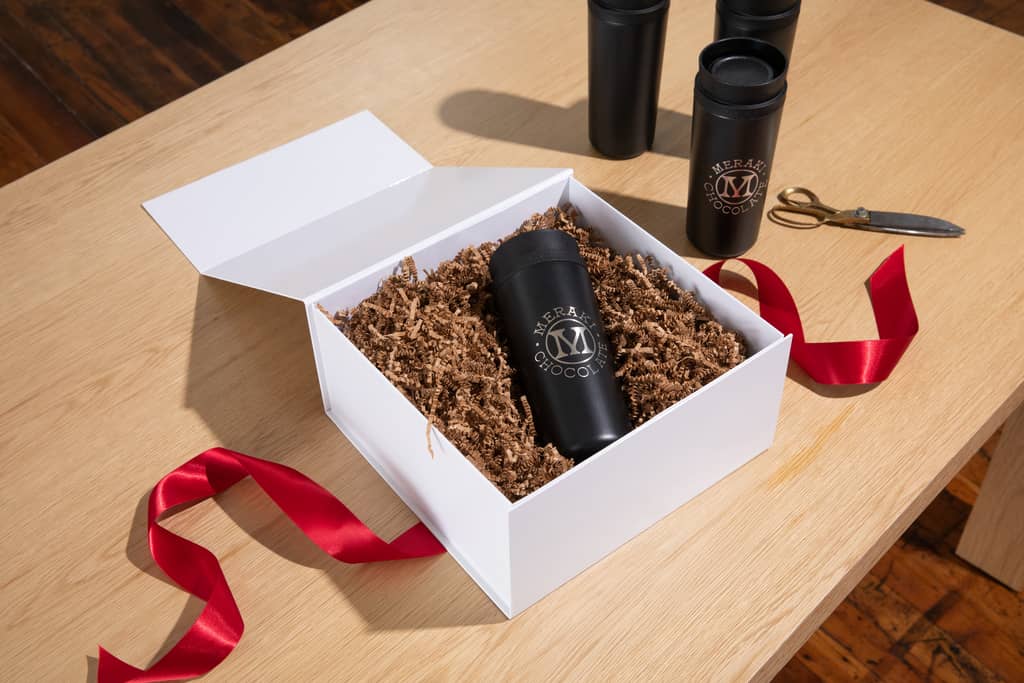
Personal touches make gifts special
Even the best gift can feel transactional if it is handed out with no context. Personalization transforms a moment of recognition into something emotional and memorable.
Employees say the following gestures make a gift feel truly personal:
- 50% prefer a handwritten note.
- 42% enjoy public team recognition.
- 40% value when the gift references the specific milestone being celebrated.
These small additions take only a moment, yet shift the experience entirely. A manager who acknowledges the late nights someone spent wrapping up a project or highlights the years of dedication behind a work anniversary makes the celebration feel sincere rather than routine.
Whether it is a line about how the employee contributes to team morale or a quick mention of what they achieved, the message makes the meaning. The gift becomes a symbol of appreciation, not just a company expense.
Match the gift to the occasion
A well-chosen gift does more than celebrate a milestone. It shows intention. Employees notice when the present aligns with the moment they are being recognized for.
Survey responses reveal clear preferences about which gifts feel most fitting:
• Food and snacks make birthdays feel festive: 48%
• Apparel is the leading pick for work anniversaries: 32%
• Desk items like premium notebooks or pen sets feel right for promotions: 28%
Setting simple guidelines such as “snacks for birthdays” or “branded apparel for anniversaries” takes the guesswork out of gifting. It gives managers confidence to act quickly while ensuring the experience is consistent and fair across the entire company.
Even better, choosing items that support the next stage of someone’s contribution, like a travel bag for a promotion or a cozy fleece for a winter work anniversary, reinforces excitement about what comes next.
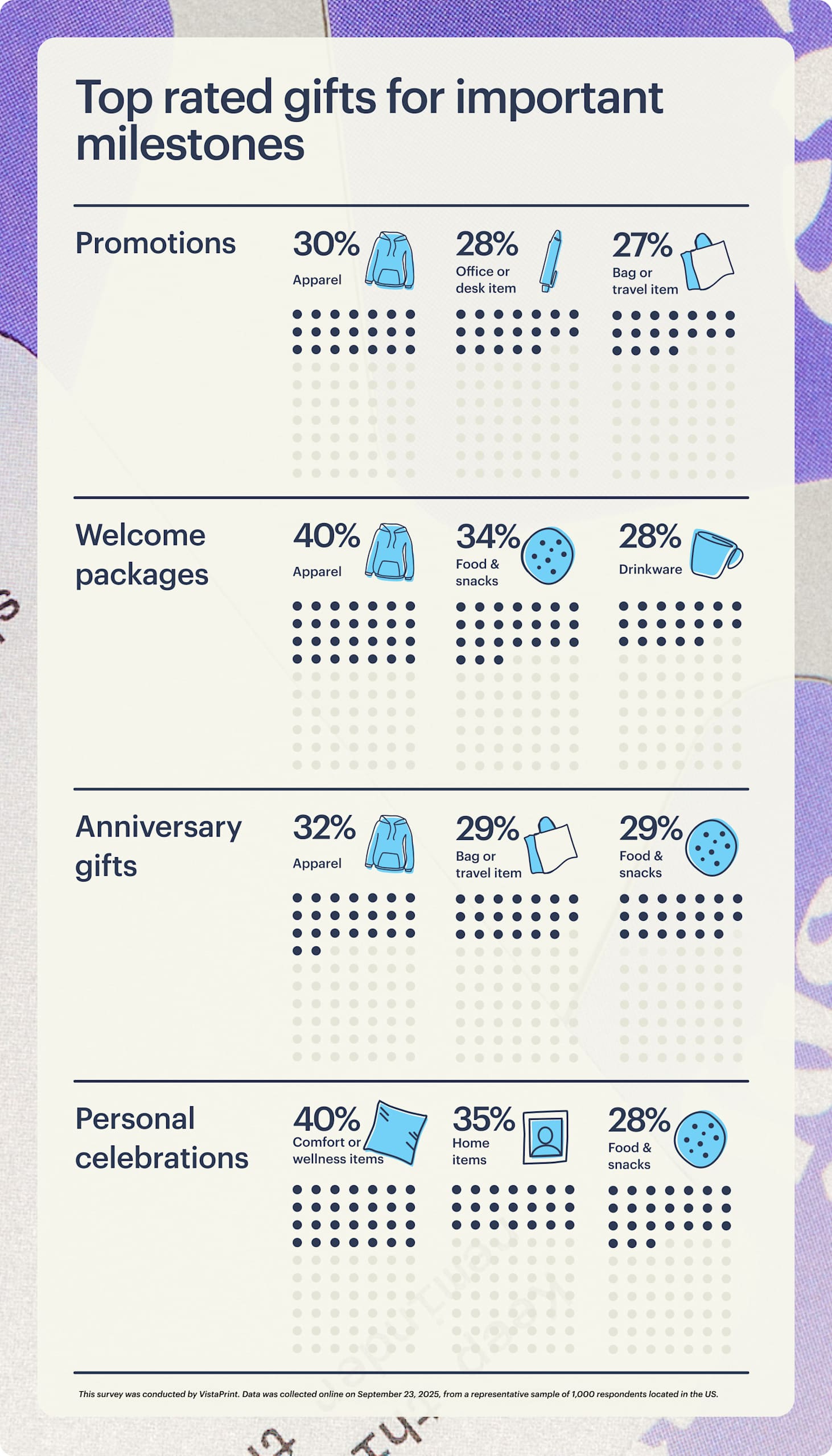
One great gift beats many little ones
When it comes to recognition, quality outweighs quantity. Employees prefer one gift that feels significant rather than several that feel forgettable.
Here is how preferences shake out:
- 42% want a single premium gift
- 32% prefer multiple smaller gifts
- 26% have no preference either way
The exception is Gen Z. With 44% preferring frequent mini moments, they value recognition throughout the year rather than a single splashy occasion.
This demonstrates the importance of audience awareness. Offering options or creating a mixed strategy (one hero moment plus small touchpoints) can help companies maximize impact for different generations and personality types.
The most important thing is that the employee walks away feeling like the moment mattered.
Corporate gifts drive motivation, loyalty and advocacy
Recognition is not only a kindness. It is a strategic investment that strengthens engagement and culture.
Employees who feel valued show it in meaningful ways:
- 62% feel more motivated to do their best work.
- 54% say recognition would make them stay longer.
- 49% would recommend their employer as a great place to work.
- 36% are more likely to share positive posts on social media.
The equation is simple. When companies show appreciation, employees respond with energy, loyalty and pride. Retention costs are high. Missed milestones are costly, too. A thoughtful corporate gift can deliver culture-building ROI that many other programs struggle to match.
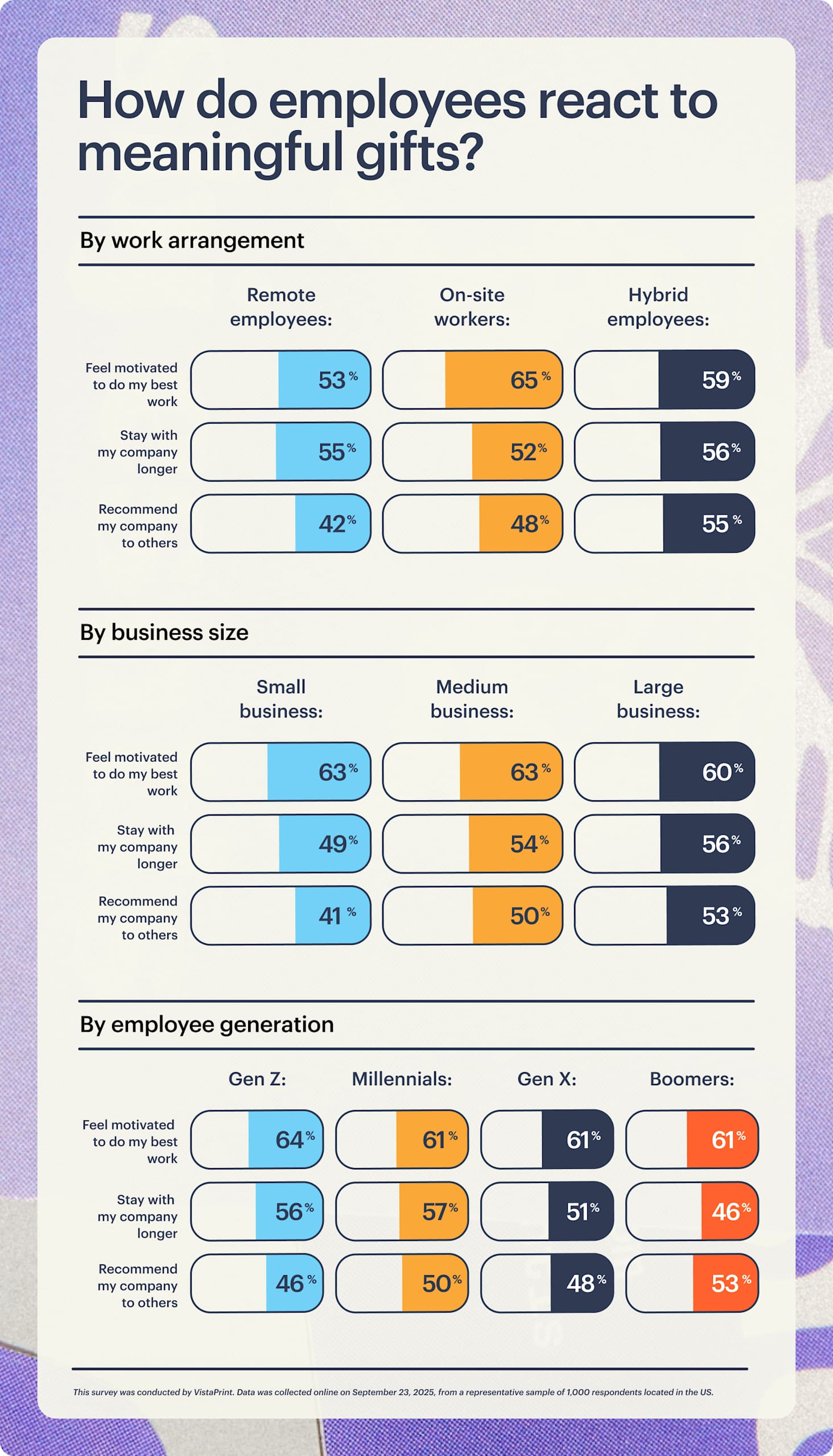
How to build a meaningful gifting strategy
Employee gifting should feel intentional and not like a box the company checks once a year. A strategy brings consistency, fairness and impact to every celebration. Here is how to make gifting an easy win for motivation and culture.
A checklist you can follow right now
- Prioritize the milestones that matter most
Pick two or three key moments, such as work anniversaries or promotions. Build them into a yearly calendar so every employee knows recognition is coming. - Create clear gift tiers
Set budgets that scale with the milestone, so gifting feels fair and consistent. For example, everyday wins might stay under $20 while major achievements deserve more. Find options tailored to every budget in VistaPrint’s corporate gifts range. - Include everyone, no matter where they work
Choose gifts that travel well and work for onsite, hybrid and remote roles alike, such as branded drinkware or premium snacks. - Empower managers to make it personal
Provide simple templates for notes or shout outs so leaders can add human warmth where it matters most. The message often matters as much as the merchandise. - Offer a little choice
Let people pick from a small selection that reflects their interests. Even modest personalization makes gifts feel much more special. Explore tailored options like custom apparel that help teams feel proud of where they work. - Track what makes a difference
Measure how many milestones get celebrated and listen for feedback in engagement and retention signals. If people feel more motivated and valued, your strategy is working.
Build a culture where recognition is real
Corporate gifting is not just about giving things. It’s about acknowledging effort, celebrating progress and making sure people feel seen. The data shows that when employees receive meaningful gifts at the right moments, motivation rises, loyalty strengthens and pride in the workplace grows.
The most impactful gifts are thoughtful, practical and personal. They match the milestone, reflect the person and come with a message that shows genuine appreciation. A consistent strategy ensures recognition is fair, predictable and felt across teams and work styles.
When employees know their contributions matter, they bring more energy and commitment to their work. Recognition becomes a shared value rather than a one-off moment.
Methodology
This survey was conducted online on September 23, 2025, with a representative sample of 1,000 employed respondents in the United States. Participants included onsite, hybrid and fully remote workers across small, medium and large organizations. Respondents were grouped by generation for comparison:
- Gen Z (18 to 27)
- Millennials (28 to 43)
- Gen X (44 to 59)
- Boomers (60 to 78)
- Post War (79 to 85)
Respondents were able to select multiple preferences. Results were rounded to the nearest whole percentage.
